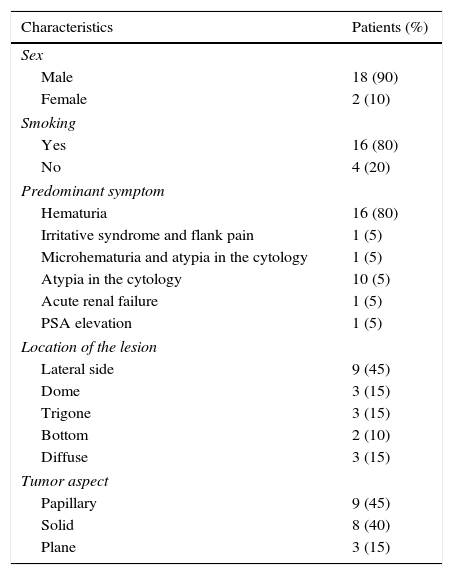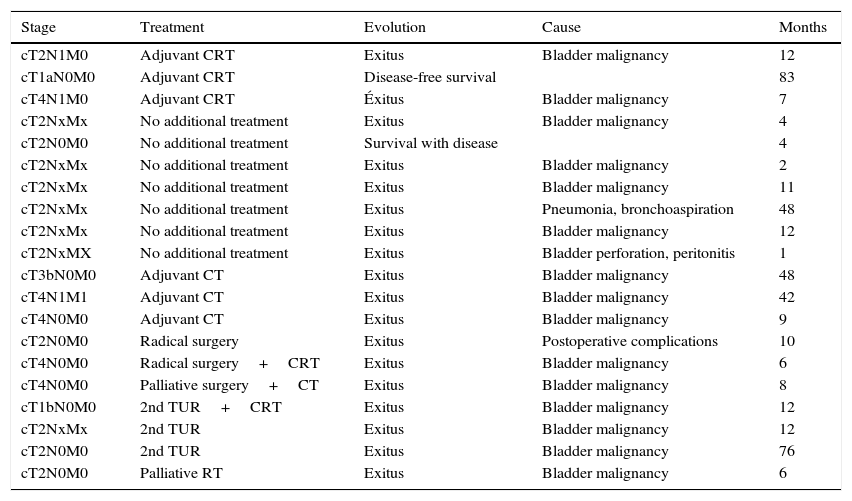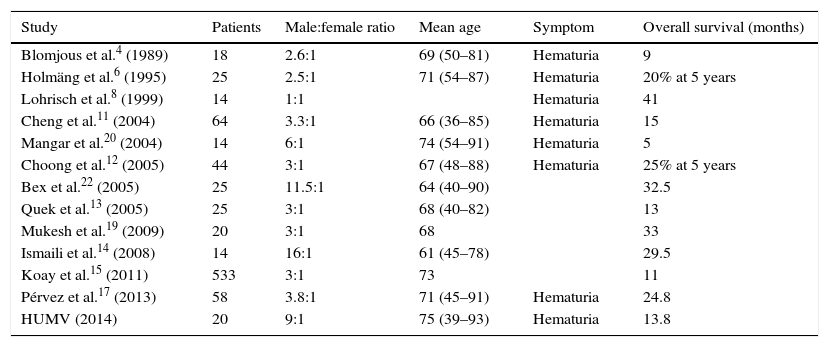Microcytic carcinoma of the urinary bladder or bladder small cell carcinoma (SCC) is a rare entity, characterized by an aggressive behavior, with a poor prognosis, elevated metastatic potential, and is commonly found in older patients and in advanced disease stages. Here we present our experiences with the behavior of the disease and the treatments applied.
Material and methodThis was a retrospective study on patients diagnosed with bladder SCC in our hospital between February 1992 and February 2014. We analyzed the demographic and clinical characteristics of the tumor, the applied treatments and survival. We performed a descriptive statistical analysis of the median follow-up time, overall survival (OS) and cancer-specific survival (CSS), using the SPSS statistical package v. 15.0.
ResultsOver 22 years, 20 patients with an average age of 75 years were diagnosed with bladder SCC (2 female). The predominant symptom was macroscopic haematuria (75%).
After the first transurethral resection (TUR) of the bladder and the histological diagnosis, 35% (7 patients) did not receive additional treatment, 15% (3 patients) were treated with chemoradiotherapy (CRT), 10% (2 patients) with TUR, 15% (3 patients) with chemotherapy (QT), 5% (1 patient) with TUR associated to CRT, 5% (1 patient) with radical surgery, 5% (1 patient) with radical surgery treatment followed by adjuvant CRT, 5% (1 patient) with palliative surgery (hypogastric arteriae ligation) followed by adjuvant QT and 5% (1 patient) with hemostatic radiotherapy (RT). With a median follow-up time of 13.8 months, the OS was 14.48 months (95% CI: 6.22–22.75) and the CSS 18.04 months (95% CI: 6.51–29.57). Only 10% (2 patients) survived till the end of the study.
ConclusionMicrocytic carcinoma of the urinary bladder is a rare and aggressive entity commonly diagnosed in males of advanced age and in advanced disease stages. It has a poor prognosis and reduced survival. Due to its aggressiveness previous to the initial diagnosis, a cystectomy is only possible in very few cases; therefore multimodal treatment is necessary. This treatment is yet to be defined.
El carcinoma microcítico vesical (CMCV) o carcinoma de células pequeñas es una enfermedad infrecuente, agresiva, de mal pronóstico y alto poder metastásico; se presenta en edades y estadios avanzados. Presentamos nuestra casuística evaluando su comportamiento y los tratamientos aplicados.
Material y métodoRevisión retrospectiva de pacientes diagnosticados de CMCV en nuestro hospital entre febrero de 1992 y febrero de 2014. Analizamos características demográficas, clínicas y propias del tumor, los tratamientos aplicados y la supervivencia. Análisis estadístico descriptivo del seguimiento medio (SM), supervivencia global (SG) y supervivencia cáncer específica (SCE) mediante el programa SPSS versión 15.0.
ResultadosEn esos 22 años se diagnosticaron 20 pacientes con CMCV (solo 2 mujeres), con edad media de 75 años. El síntoma predominante fue la hematuria macroscópica (75%). Tras la RTU-V inicial y el diagnóstico anatomopatológico el 35% (7 pacientes) no recibió tratamiento adicional, el 15% (3 pacientes) recibió quimiorradioterapia (QRT), el 10% (2 pacientes) RTU el 15% (3 pacientes) quimioterapia (QT) el 5% (un paciente) RTU asociada a QRT, el 5% (un paciente) cirugía radical, el 5% (un paciente) cirugía radical asociada a QRT adyuvante, el 5% (un paciente) cirugía paliativa (ligadura de arterias hipogástricas) asociada a QT adyuvante y el 5% (un paciente) radioterapia (RT) hemostática. Con un SM de 13,8 meses, la SG fue de 14,48 meses (IC 95%: 6,22-22,75) y la SCE 18,04 meses (IC 95%: 6,51-29,57), permaneciendo únicamente 2 pacientes vivos (10%) al final del estudio.
ConclusiónEl CMCV es una neoplasia vesical infrecuente y agresiva que se diagnostica más frecuentemente en varones de edad y estadios avanzados, de pronóstico desfavorable y escasa supervivencia. Debido a su estadio local avanzado al diagnóstico la cistectomía es aplicable en muy contados casos, debiendo recurrir a un tratamiento multimodal, aún por definir.
Artículo
Comprando el artículo el PDF del mismo podrá ser descargado
Precio 19,34 €
Comprar ahora











